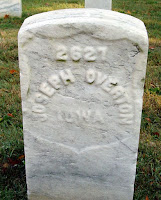This is the week I complete --- at last --- that roster of Lucas County's war dead I've been writing about now and then. If I don't, Earl Comstock is going to have my hide and run it up a flagpole --- the roster is scheduled to be inscribed in granite and then installed at Veterans Memorial Park this year; time is growing short.
So I'll finish up the "Ps" and the "Rs" of the Civil War list today and tomorrow and then be done. In all, about 140 Lucas County men gave up their lives during Civil War service and tracking them down has been a little complicated.
But think about that number, taken from what at the time was a rather small Iowa county population-wise. Although these men are largely forgotten now, nearly everyone living here then would have been related to --- or a friend or neighbor of --- one of more of these men who ranged in age from 17 into their 40s.
Yesterday, while tracking down the gravesite of Pvt. Joseph Overton, I ended up at Cave Hill Cemetery and Arboretum in Louisville, Kentucky. That's a cemetery I'm kind of familiar with (as a Cemetery geek in good standing, I follow its page on Facebook). It has a reputation as one of the most beautiful cemeteries in the United States as well as being among the most innovatively managed --- and presented to the public.
It's also the final resting place of luminaries ranging from George Rogers Clark through Col. Harland Sanders to Muhammad Ali. As well as Lucas County's Pvt. Joseph Overton.
+++
Joseph and his family actually lived in Lucas County for only a very short time. He was Tennessee born, on April 4, 1832, and moved with his family into Missouri during the 1850s. By 1855, the Overtons had settled not far from Princeton in Mercer County, not far south of the Iowa line, and he was married there on Jan. 31, 1859, to Elizabeth Lindsey.
Shortly after 1860, the couple relocated to a farm in Cedar Township, Lucas County, near the village of LaGrange, where they were living with their two small children, Nancy and Robert, when Joseph enlisted at LaGrange on June 24, 1863, in Company F, 8th Iowa Volunteer Cavalry. Nancy then returned with her children to Mercer County and lived out the remainder of her life there.
On Oct. 30, 1864, the 8th Cavalry and other units were involved in a skirmish with Confederate forces at Mussel Shoals, Alabama --- near Florence --- and Joseph sustained a gunshot wound that shattered his right femur and then was taken prisoner.
He was paroled on Dec. 17 and transported to Louisville, where he was taken for treatment to Crittenden General Hospital where he remained until his death six months later on May 19, 1865, of complications related to his wound.
By now, Lee had surrendered (on April 9) at Appomattox and the Civil War was winding down across the South.
Cave Hill Cemetery, which takes its name from a spring that emerges in a hillside cave in the cemetery grounds, was dedicated in 1848 as one of the earlier "garden cemeteries" in the United States, intended to be both a burial place and an uplifting spot of natural beauty to engage visitors.
In 1861, the Cave Hill Cemetery Co. donated a section of the cemetery for the burial of Union soldiers who died in and near Louisville and what now is the National Cemetery consists of several Cave Hill sections added to the original section as the years passed. Because there is no room for expansion, the National Cemetery is closed to future burials.
But it was to this lovely spot that Pvt. Joseph Overton's remains were brought and buried during the spring of 1865.
Additional information about Cave Hill Cemetery and Arboretum is available on its web site, which is located here.




No comments:
Post a Comment